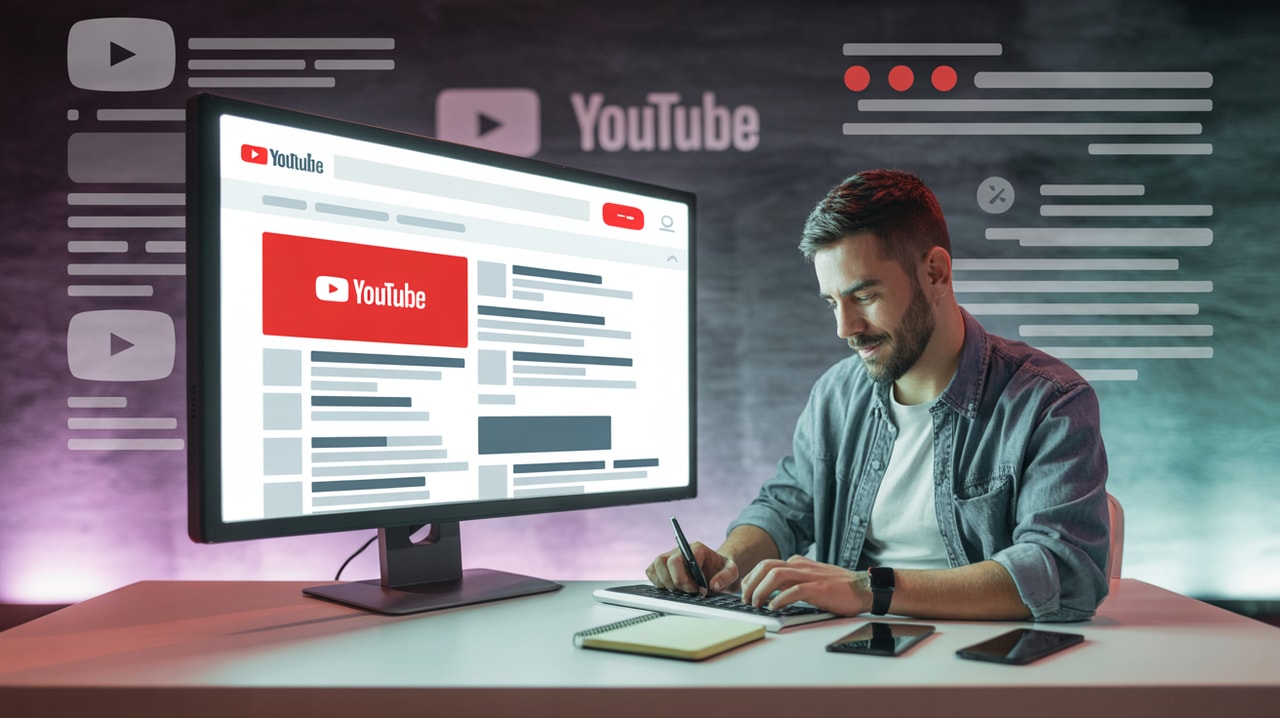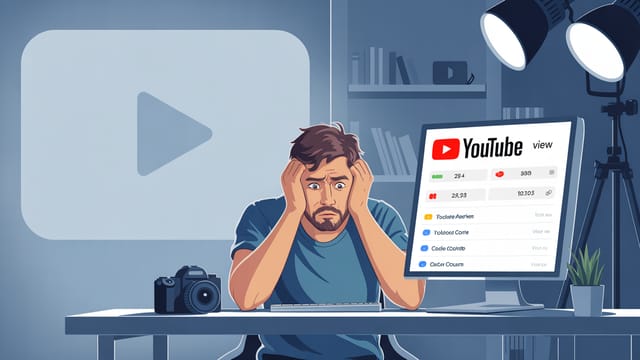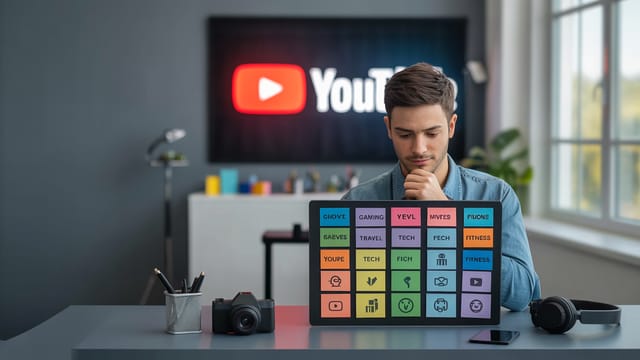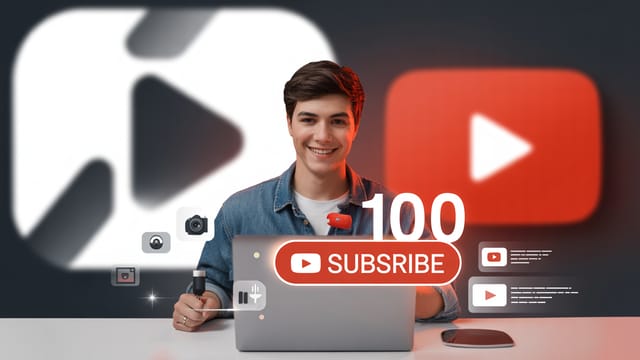
Ready to get your next 10,000 subscribers?
Join thousands of creators who use Subscribr to create faster, better YouTube videos.
How to Optimize YouTube Descriptions for More Views & Engagement
Your YouTube description isn't just a box below your video; it's prime real estate for boosting your video's visibility and encouraging viewers to take action. Many creators feel confused about what to write or how long it should be, missing out on a powerful tool for growth.
In 2025, optimizing your YouTube description is less about keyword stuffing and more about providing value for both the YouTube algorithm and your potential viewers. A well-crafted description helps YouTube understand your video's topic and recommend it to the right audience, while also giving viewers a reason to watch and engage.
Let's break down how to write descriptions that drive clicks, views, and channel growth.
Why Your YouTube Description Matters More Than You Think
Think of your description as a helpful guide for both the algorithm and your audience.
For the algorithm, the text in your description provides crucial context about your video's content. While YouTube's understanding of video content has evolved significantly, relevant keywords and clear language in your description still play a role in discoverability.
For viewers, the description is an opportunity to learn more about your video before they click or while they're watching. It's where you can expand on your title, provide resources, include calls to action, and make your content easier to navigate.
Optimizing your description is a key part of on-video optimization, working alongside your title, thumbnail, tags, and chapters to maximize your video's performance.
Crafting the Perfect YouTube Description: Key Elements
An effective YouTube description is structured strategically, with the most important information front and center.
The Critical "Above the Fold" Section
The first 2-3 lines of your description are the most important because they are visible to viewers before they click "show more." This is your chance to grab attention and provide immediate value.
- Hook Your Viewer: Start with a compelling sentence or two that expands on your title and clearly states what the video is about. Make it engaging!
- Front-Load Keywords: Naturally include your primary keywords within these first few lines. This immediately signals the topic to the algorithm and confirms to viewers that the video is what they're looking for.
- Include Your Primary Call to Action (CTA): Place your most important call to action here. Do you want viewers to subscribe, visit a website, download a free guide, or watch another video? Put that link and instruction where it's immediately visible. The Think Media video on description setup strategically places a link to their description template and free class near the very top.
Expanding Below the Fold: Providing Value and Context
While the top few lines are crucial, the rest of your description provides valuable space for more detail and additional links.
- Natural Keyword Integration: Weave relevant keywords and phrases naturally throughout the description body. Write paragraphs that provide a summary of your video, touching on the key points covered. Avoid simply listing keywords; focus on creating readable, informative text that includes variations of your main topic. The description for the DecodingYT video "How to Write Perfect TITLE, DESCRIPTION, TAGS for More Views on YouTube!" does a good job of integrating keywords like "write title tag description for YouTube videos" and "seo for YouTube videos" naturally within the introductory paragraphs.
- Timestamps and Chapters: For longer videos, include timestamps to create chapters. This helps viewers navigate your content easily, jumping to sections they're most interested in. Timestamps also provide additional opportunities to include keywords related to specific points in your video.
- Secondary Calls to Action: Further down the description, you can include additional CTAs. This might include links to your social media profiles, other relevant playlists (recommended over linking single videos to keep viewers on your channel longer), merchandise stores, or affiliate links.
- Resource Links: Link to any resources mentioned in your video, such as websites, tools, or free downloads.
- Channel Information: Include consistent information like a brief channel description, links to your website, and relevant disclaimers. You can set up upload defaults in YouTube Studio (or within Subscribr's channel management features) to automatically include this standard information in every new video description, saving you time.
How Long Should a YouTube Description Be?
There's no strict rule for description length, but YouTube allows up to 5,000 characters. The ideal length is whatever is needed to comprehensively describe your video, include relevant keywords naturally, provide valuable links, and incorporate necessary calls to action and information.
Focus on quality and relevance over hitting a specific word count. A short, punchy description might work for a quick vlog, while a detailed tutorial or documentary will benefit from a longer, more in-depth description with timestamps and resources. Prioritize the first few lines, as that's what most viewers will see immediately.
Do Keywords in YouTube Description Help?
Yes, keywords in your YouTube description still help, but not in the outdated way of simply stuffing as many terms as possible. Today, keywords help the algorithm understand the context and topic of your video so it can be recommended to viewers searching for or interested in that topic.
Focus on using relevant keywords naturally within well-written sentences and paragraphs. Use variations of your primary keyword and include related terms that accurately reflect your video's content. This helps YouTube categorize your video correctly and match it with relevant search queries and viewer interests.
The youtube_strategy insights emphasize including primary keywords early and using related keywords naturally throughout. Tools like Subscribr's Research Assistant can help you identify relevant terms and topics to inform your description writing.
Structuring Your Description: A Template Idea
While you can customize it based on your video type, here's a general structure to consider for your YouTube descriptions, drawing from the youtube_strategy advice:
- Short Hook/Video Summary (1-2 sentences): Engaging introduction with primary keywords.
- Primary Call to Action: Your most important link (subscribe, website, freebie, etc.). Ensure this is within the visible "above the fold" section.
- Video Summary/Overview (1-2 paragraphs): Expand on the video's content, naturally including related keywords.
- Timestamps/Chapters: (If applicable) Easy navigation for viewers.
- Links to Related Playlists/Videos: Promote your other content strategically.
- Other Calls to Action: Social media, merchandise, email list signup.
- Resource Links: Any external sites or downloads mentioned.
- About Your Channel (Optional): Brief overview for new viewers.
- Disclaimers/Legal (If necessary).
- Hashtags: 3-5 relevant hashtags at the very end.
Using Tools to Optimize Your Descriptions
Writing effective descriptions for every video can feel like a lot of work, but tools can significantly streamline the process.
Subscribr is designed specifically for YouTube creators and offers features that can help you optimize your descriptions. Instead of relying on generic AI tools, Subscribr's AI Script Writer and Research Assistant are built with YouTube's ecosystem in mind.
You can use Subscribr's AI to help generate initial description drafts, ensuring they include relevant keywords naturally and follow a strategic structure. The Research Assistant can help you identify relevant topics and terms to ensure your description is contextually rich. Furthermore, you can leverage Subscribr's channel management features to set up and manage your upload defaults, automatically including essential information in every description.
By using a tool like Subscribr, you can save time while ensuring your descriptions are optimized for both the algorithm and viewer engagement.
Conclusion
Optimizing your YouTube descriptions is a simple yet powerful step you can take to boost your video's performance. By focusing on the crucial "above the fold" section, naturally integrating relevant keywords, including strategic calls to action, and utilizing features like timestamps, you can significantly improve your video's discoverability and encourage viewers to engage further with your content and channel.
Don't let the description box be an afterthought. Treat it as a valuable tool for growth, and you'll see the difference it can make in getting more views and building a more engaged audience. Use the insights here and leverage tools like Subscribr to make description optimization a seamless part of your video workflow.





